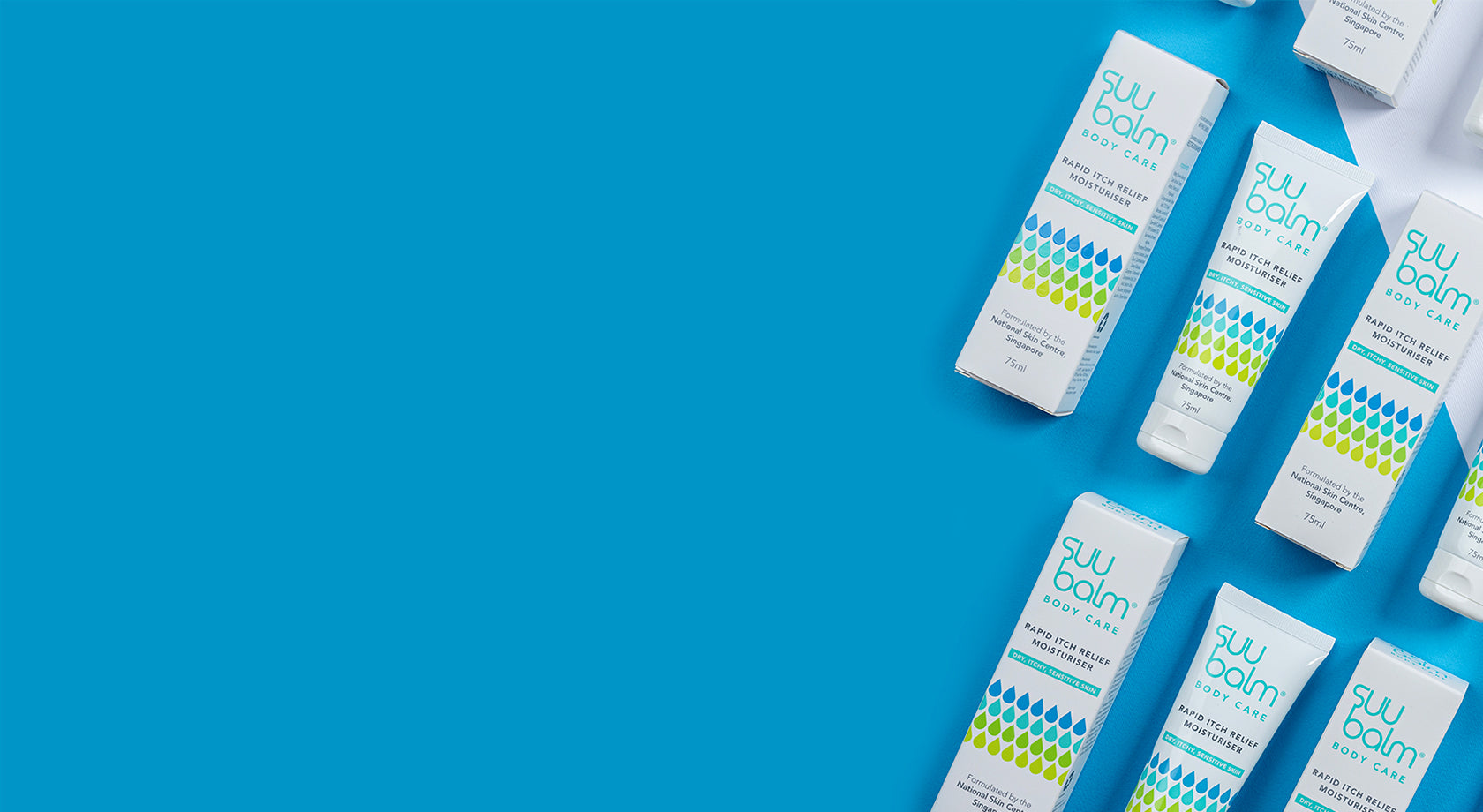There is no definitive cause of eczema, instead, there is a combination of factors that involve genes and triggers.
Eczema sufferers tend to have an over-reactive immune system that is affected by substances that occur outside the body and produce inflammation. They can also react to other symptoms caused by the body that produces the same effect.
There is genetic evidence that eczema sufferers can also suffer from a lower level of the protein filaggrin. This protein is essential for maintaining a strong barrier on the upper layer of the skin. When the skin is weakened by the lack of filaggrin it allows moisture to escape and fails to prevent infection and bacteria from entering the dermis. Therefore, eczema sufferers tend to have dry skin that is prone to infection.
Understanding what triggers eczema is essential for managing the condition but every sufferer is different. Some people are affected by the seasons and others may find their eczema affects different parts of the body depending on the triggers.
Dry skin is a common complaint and if left untreated it can become scaly and dry. The skin can become tight and lead to splitting and bleeding areas. Having a routine that keeps your skin moisturized is an essential part of keeping eczema flare-ups from occurring.
Recognize common irritants
There are everyday products that can cause the skin to become irritated and dry. Natural substances can also cause adverse reactions and it is important to recognize what are the triggers that cause your eczema to flare.
Common irritants
- Scented soaps and household cleaners
- Baby wipes
- Fragrances
- Smoke
- Shampoo and body lotion
- Fabrics such as wool and polyester
- Fruit juice
- Metals, particularly nickel – found in items like belt buckles, bra hooks, coins, keys, kitchen utensils, pens and zippers among countless other items.
Allergens are also a trigger for eczema sufferers, and they can be affected by pollen, dust mites, animal hair, household mold, and dandruff. Allergens can cause the symptoms to become more pronounced and extend the length of the flare-up. It is important to understand what allergens affect eczema and help keep symptoms under control.
Climate and weather affect most sufferers and they experience a negative reaction when the temperatures soar. Hot weather and sweating can produce a prickly sensation and, in the summer, or when exercising. During the winter months, skin tends to dry, and this can lead to inflammation and bouts of eczema. Hot showers and baths should also be avoided as they can also bring on the condition.
Stress is also a common trigger for eczema sufferers. There is no scientific explanation of why emotional stress can worsen symptoms, but some people will feel their eczema flare whenever they are feeling stressed.
Treatments for people with eczema
Regular cleaning and moisturizing are essential but will not always be enough to keep the condition at bay unless it is a specific kind of eczema cream. Prescription meds are available, and research is ongoing to find long term solutions. In the meantime, here are some effective treatments for severe eczema:
Emollients & Moisturisers
There are several different emollients available and they come in the form of lotions, creams, and ointments. They are classed as such based on the amount of oil they contain. There are plenty of options out there and, ideally, you should use a mix of emollients such as:
- Ointment for the driest parts of your skin
- Cream or lotion to treat the less dry skin
- Replace soap with an emollient for cleansing your face
- Choose another emollient for cleansing the body
There are many over-the-counter options when it comes to moisturisers. Oils, balms, lotions and eczema creams. But the important thing to note is the ingredients that these moisturisers contain. Many eczema patients are not aware that some ingredients such as parabens and artificial fragrances are allergens and may cause flare ups as they aggravate eczema-prone skin.
Choosing a moisturiser that is gentle and uses safe ingredients is not enough. With eczema patients, the most debilitating factor that patients deal with is itch. So, the important key here is finding a moisturiser that helps to stop the itch. A moisturiser like Suu Balm can help. It contains menthol that helps to relieve the itch FAST and contains real, skin-like ceramides to repair the skin barrier. With continued use, it can help to keep your eczema flare ups at bay!
Washes & Cleansers
There are many cleansers out there that claim to help with eczema. Some are made from olive oil, goats’ milk and Dead Sea salt to mention just a few. Choose a wash that works best for you but remember, when you have eczema, your skin barrier is impaired. Washing or bathing for too long may dry out the skin so, it is important to choose a cleanser or wash that is gentle and does not strip the skin of its natural moisture.
You may consider an eczema body wash from Suu Balm. It is thick, smooth, creamy and contains 5x moisturising ingredients. Best of all, it is ultra gentle and contains no soaps, sulphate, SLS, SLES, parabens, preservatives or artificial fragrances that may potentially cause a flare up.
Wet dressings
This is an effective way to treat eczema but does involve medical assistance. The dressings are spread with a corticosteroid cream and applied to the affected area. These wet dressings are then protected with a further layer of dry dressings. While the treatment sounds simple it is best left to the experts to apply the dressings initially. The doctor can then show the patient how to apply the dressings correctly so they can be done at home.
Medical inhibitors
These are prescription-only creams that are applied directly to the affected area. They work to reduce the inflammation and modify the immune system. They can be used on all parts of the body and do not cause skin thinning with long term use. The creams are available in a range of strengths and can be effective in treating mild to severe eczema. These creams are not the first-line treatment recommended by doctors but can be used if other methods are ineffective. They can cause side effects including a burning sensation, mild irritation and redness of the skin. Not everyone will be affected, and the effects will lessen with each application.
Oral medication
Not everyone will respond to creams and in these cases, a doctor would prescribe a range of oral medications that work by affecting the immune system. Slowing the response rate will help alleviate the severity of eczema. This type of medication is also designed to help sufferers whose eczema is not in one specific area.
While the effectiveness of these medications is undeniable, they can also cause some severe side effects including:
- Increased risk of infection
- Nausea and vomiting
- Increased blood pressure levels
- Organ damage, kidneys, and liver can both be affected depending on the medication
Because of these side effects, these types of treatments are only recommended for short periods.
Light therapy
If creams are proving ineffective, then light therapy can be used to treat severe cases of eczema. The process is known as phototherapy and can involve both UVB light and UVA. Both these types of ultraviolet light treatments can be effective for up to 70% of eczema sufferers.
The treatment will be administered by a certified dermatologist two or three times a week. The frequency of the visits can be adjusted depending on the success of the treatment and improvements will be seen around the 4-week mark.
Biologic medications
There is research indicating that an injected form of the drug can help control eczema in patients who are unable to use topical creams. In 2017 the drug dupilumab whose trade name is Dupixent was approved for use in the treatment of moderate to severe cases of eczema. The clinical trials showed improvements over a 4-month period, with clearer skin and reduced itching in the majority of participants. This medication is also associated with common side effects including conjunctivitis and inflamed eyelids.
While eczema can feel unbearable there are medications and therapies available. Improve your quality of life and contact a dermatologist or doctor if the symptoms become severe.







